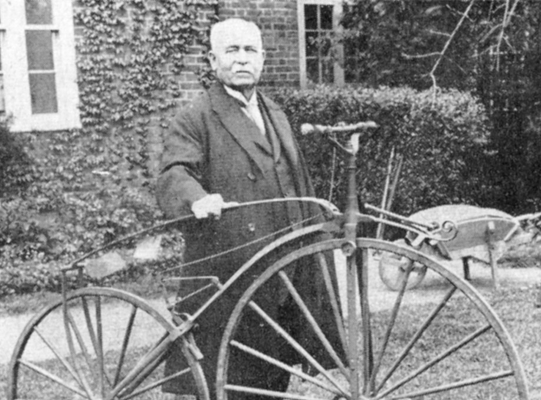James Moore was cycling’s first superstar, way back in 1868. This placed him among other Victorian celebrities, such as air balloonists, phantasmagorists, burlesque dancers, and just Egypt as a concept.
Moore was not the glowing star of a small sport, either. For Moore’s contemporaries, the prize money for winning races tallied up to what would amount to about six months worth of wages for the average worker, and huge crowds gathered at the races to spectate.
James Moore wasn’t the cycling’s first superstar only because he arrived in the sport’s infancy. But it probably helped: history records his tale with one monumental detail that’s hard to ignore – he was the winner of the world’s first bicycle race.
That’s not to say that the sport he competed in would be very familiar to modern cycling fans. Events were segregated by details such as wheel size and method of propulsion, with the bicycle operating as a catch-all category that encompassed more wacky bike designs than a British charity sportive.

Race distances in the sport’s earliest days were mere sprints, with Moore’s race just 1km on the grass of the Parc de St-Cloud in Paris. Races moved to the road the following year, but it would be another 42 years before the Tour de France tackled mountains with its inaugural ascent of the Tourmalet. Which means Moore had more in common with famous track individual pursuit star Bradley Wiggins than his road counterpart, famous Tour de France champion Bradley Wiggins.
Still, Moore won the first-ever bike race. And what it can tell us about cycling is that certain bicycle categories have been taken more seriously than others since the very start. Because Moore didn’t in fact even win the first bike race that day.

The earliest bicycle race that day was the 1km race for velocipedes under 1 meter in wheel diameter. It was won by Edward-Charles Bon.
It’s naïve to imagine that even the earlier race that day really was the first ever bike race: you don’t need to have a Margaret Mead level of understanding of human interactions to guess that the first bike race took place approximately 30 seconds after the second bicycle was built. But while the 1km race for velocipedes of 1 meter in wheel diameter at St Cloud may not have technically been the first race, perhaps the sport—and its enduring predilection for romantic myth—was born with Moore’s victory.
Despite later years that involved serving in the Franco-Prussian war, becoming a veterinarian, and taking up tennis, Moore remained a cycling superstar for his entire life. Upon his death aged 87, Cycling Weekly wrote a spirited obituary, “The part that James Moore played in the history of cycle racing, while of brief duration, was historically of the greatest importance.” And to this day you can visit the Parc de St-Cloud in Paris to see the plaque erected in his honor.


